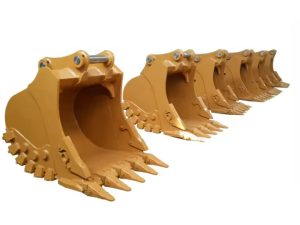
When it comes to excavating tough terrains, the excavator rock bucket stands out as a vital attachment for heavy machinery. Designed specifically for handling highly abrasive materials, this bucket excels in various applications, including quarry work and digging on rocky soils. Below, we explore its key features, types, and selection criteria to help you make an informed decision.
Types of Excavator Rock Buckets
Excavator rock buckets come in several configurations to suit different needs:
- General Purpose Rock Buckets: Ideal for a range of materials, these buckets balance durability and versatility.
- Heavy-Duty Rock Buckets: Built for intense use, these buckets are reinforced to withstand rigorous conditions.
- Skeleton Buckets: Designed for sifting and sorting, skeleton buckets allow operators to separate larger materials from loose soil efficiently.
- Specialized Buckets: Some manufacturers offer specific models tailored for unique applications, such as coral rock excavation or other specialized tasks.
Key Features
- Durability: Most rock buckets are constructed from high-strength materials like Hardox steel, providing resistance to wear and tear in abrasive environments.
- Teeth Design: The design and arrangement of teeth are crucial for optimizing digging efficiency. Options include single or multiple teeth configurations, with various sizes and shapes to match different materials.
- Attachment Compatibility: Excavator rock buckets are designed to fit a variety of machines, including brands like Caterpillar, Komatsu, John Deere, and Case. This versatility makes it easy to upgrade or replace attachments without extensive modifications.
Selection Criteria
When choosing an excavator rock bucket, consider the following factors:
- Bucket Size: Match the bucket size to your excavator’s class and the specific job requirements. Larger buckets may provide higher capacity but can affect maneuverability in tight spaces.
- Material Type: Identify the types of materials you’ll be working with. For instance, a bucket designed for heavy rock may not perform well in softer soils.
- Operational Needs: Assess whether you need a bucket for heavy lifting, sifting, or both. This will influence your choice of bucket type and design.
- Manufacturer Reputation: Opt for well-established manufacturers known for quality and reliability. Brands like Caterpillar and Epiroc offer proven products that are widely used in the industry.
Conclusion
The excavator rock bucket is an indispensable tool for construction and excavation projects involving challenging materials. By understanding the different types, key features, and selection criteria, you can choose the right rock bucket for your specific applications. Investing in a high-quality excavator rock bucket not only enhances your machine’s capabilities but also improves overall productivity on the job site. Whether you’re digging in a quarry or managing heavy debris, the right rock bucket makes all the difference in achieving efficient and effective results.
